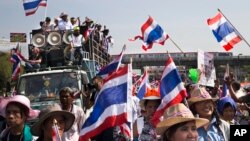Thai opposition protesters marched outside government revenue offices in Bangkok on Thursday, in another day of protests aimed at overthrowing the government.
Though thousands showed up for the march, and many more remained camped out in key intersections throughout the city, the movement appeared to be losing momentum.
Protest leader Suthep Thaugsuban is calling for an unelected people's council to replace the current government, which he claims is corrupt and engages in nepotism.
Prime Minister Yingluck Shinawatra has refused to step down. She insists on holding early elections on February 2, though the opposition has said it will boycott the polls.
This week's protests have been peaceful, as police have largely stayed away and avoided conflict. However, the protesters have also been unsuccessful at shutting the government down, as they had planned.
Thailand has experienced regular political turmoil in recent years. The conflict pits Bangkok's urban middle class and royalist elite against the mostly poor, rural supporters of Yingluck and her brother, ex-Prime Minister Thaksin Shinawatra.
Thaksin, who was ousted in a 2006 military coup, remains very influential in Thailand, even though he was convicted of corruption and lives in self-imposed exile.
Yingluck's Pheu Thai party is expected to easily win the February vote, thanks to the popularity of her brother, who remains popular in part because of social welfare programs he enacted.
Though thousands showed up for the march, and many more remained camped out in key intersections throughout the city, the movement appeared to be losing momentum.
Protest leader Suthep Thaugsuban is calling for an unelected people's council to replace the current government, which he claims is corrupt and engages in nepotism.
Prime Minister Yingluck Shinawatra has refused to step down. She insists on holding early elections on February 2, though the opposition has said it will boycott the polls.
This week's protests have been peaceful, as police have largely stayed away and avoided conflict. However, the protesters have also been unsuccessful at shutting the government down, as they had planned.
Thailand has experienced regular political turmoil in recent years. The conflict pits Bangkok's urban middle class and royalist elite against the mostly poor, rural supporters of Yingluck and her brother, ex-Prime Minister Thaksin Shinawatra.
Thaksin, who was ousted in a 2006 military coup, remains very influential in Thailand, even though he was convicted of corruption and lives in self-imposed exile.
Yingluck's Pheu Thai party is expected to easily win the February vote, thanks to the popularity of her brother, who remains popular in part because of social welfare programs he enacted.





